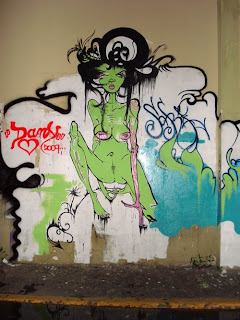Mientras pensamos sobre
esto de la "caída" o "la muerte" del reguetón, ayer publicó Reuters "
La fiebre del reguetón sacude a la Isla", refiriéndose a Cuba. Aquí la foto que acompaña el artículo:

Ya que el artículo me cita, a continuación la conversación electrónica completa que tuve con el periodista que escribió el artículo de Reuters, Esteban Israel:
Esteban Israel: es normal que el establishment rechace al reggaeton? que es lo que tanto molesta a las autoridades cubanas, en tu opinión?Raquel Z. Rivera: No es de sorprender que el "establishment" rechace el reggaeton. Esas mismas preocupaciones en cuanto al "deterioro de los valores tradicionales" la han tenido (y la tienen) las autoridades, los educadores, los padres etc. en Puerto Rico, República Dominicana y otros países latinoamericanos en cuanto al reggaetón. En Jamaica, el dancehall reggae recientemente y ya por muchos años ha sido objeto de una agria controversia en cuanto a lo mismo. Menciono al reggaetón y al dancehall reggae primero porque son parte de la cultura popular contemporánea, no son muy antiguos y son muy parecidos entre sí. Pero géneros anteriores como la rumba, la salsa, la bomba, la danza, el jazz, la samba... todos fueron muy criticados en su momento y las autoridades usaron muchos de los mismos argumentos. Mira
el excelente artículo de Brenda Hopkins Miranda que da una idea de todos esos debates anteriores.
Las autoridades cubanas están molestas por las mismas razones que las autoridades en otros países: el reggaetón (y el dancehall reggae) tiende a ser hiper-sexual (en sus letras y baile) y a glorificar el consumismo y la moda. Claro en un país socialista como Cuba, el asunto del consumismo es aun más problemático para las autoridades. El "establishment" en esos países también ha criticado mucho el sexismo del reggaetón. Eso es bastante irónico considerando lo sexistas que son nuestras sociedades en general. El "establishment" es sexista. Los "valores tradicionales" son sexistas. Pero se critica al reggaetón somo si el reggaetón fuese una excepción. El reggaetón suele ser más vulgar y desfachatado, pero eso no lo hace más sexista.
Dicho sea de paso, esas mismas críticas son las que le hace el establishment en Estados Unidos al hip-hop. Estos géneros (reggaetón, dancehall reggae y reggaetón) comparten muchas características en común ya que son todos parte de la facción "urbana" dentro de la música pop.
Estoy de acuerdo con lo que te dijo el funcionario de que declararle la guerra al reggaetón sería un error. Si el ejemplo de Puerto Rico sirve de algo, es para ilustrar que los dos grandes intentos de censurar o regular el reggaetón (1995 y 2002) lo que han generado es más popularidad para el género. Si quieres leer más sobre el caso de Puerto Rico en 2002,
ve aquí.
Creo que el movimiento auto-denominado "
hip-hop education movement" en Estados Unidos debería ser emulado por todas estas personas que están preocupadas por el monopolio que tiene el reggaetón sobre la juventud. Dentro de este movimiento hay artistas y educadores que son fanáticos y expertos del hip-hop (rap y otras artes) y se dedican a profundizar el conocimiento que tienen los jóvenes sobre el hip-hop, y también utilizan el hip-hop como punto de entrada para interesar a los jóvenes en otros géneros musicales y en otras cosas como la historia, la literatura y el activismo social. Parte importante de este movimiento de educación hip-hop son los educadores y padres y activistas a quienes quizás no les gusta el hip-hop o no saben mucho de él, pero igual saben que se tienen que educar sobre el hip-hop si es que quieren comunicarse mejor con sus estudiantes. Emulando ese movimiento de educación hip-hop, las generaciones o personas no-reggaetónicas o anti-reggaetónicas podrían utilizar el reggaetón como un vehículo de comunicación con la juventud reggaetónica. Si queremos dialogar con la juventud, hay que demostrar respeto hacia ellos. Se puede y se debe criticar lo criticable del reggaetón, pero desde una perspectiva informada.
Me gusta la perspectiva del artículo "
¿Te gusta o no te gusta el reggaetón?" que fue publicado el pasado abril en Claridad. Como dice Benjamín Muñiz, el autor del artículo, ¿porqué limitar la discusión sobre el reggaetón a si nos gusta o no nos gusta el reggaetón? Hay muchísimas otras cosas que decir sobre el reggaetón. Ese género además representa una oportunidad de diálogo inter-generacional.
Esteban Israel: ademas quisiera que me cuentes que tan rico/peculiar es el reggaeton cubano en el contexto regional.
Para mi, el reggaetón cubano tiene de rico lo mismo que el reggaetón en otros lugares tiene de rico: es una música que combina la llamada "música urbana" con tradiciones caribeñas mucho más antiguas... y lo más que ha atraído a sus fanáticos es que se presta para la fiesta y el baile sexualmente explícito.











